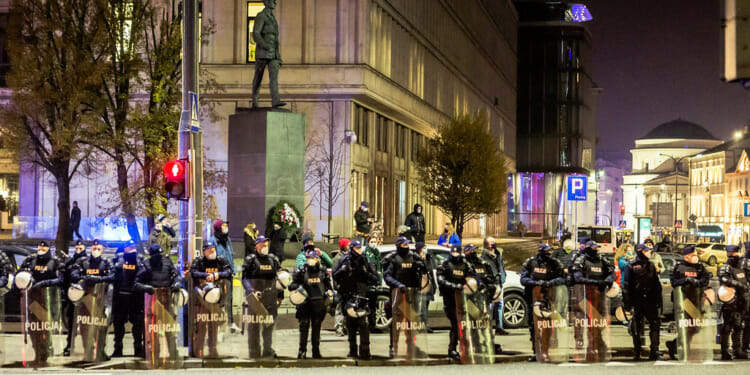Yesterday, in Warsaw, Poland’s Constitutional Tribunal issued a ruling that, as many observers have noted, directly challenges the Court of Justice of the European Union’s mandate, saying Poland’s laws overrode EU law – hence threatening the primacy of European law, one of the pillars of the European Union.
The Polish court ruled that some EU treaties go against Poland’s highest laws – saying that they conflict with the Polish constitution. If Poland goes ahead and the ruling is officially published, then both the EU Commission, the bloc’s executive arm, and the EU Court of Justice will have to not just react but act. Any member country of the EU, by its very membership, agrees to recognize the supremacy of EU treaties over its own laws, and that the EU court of justice is the supreme court of the bloc. A member who disagrees, as Poland has just done, is setting itself up to leave the union.
Jakub Jaraczewski, a research coordinator at Democracy Reporting International, described the court ruling as “a legal Polexit,” the Polish equivalent of a Brexit move out of the EU. By effectively declaring itself apart from European law, he said, Poland is on a path that “might have dramatic consequences depending on the reaction of the European Commission and the E.U. Court of Justice.” The French European Affairs Minister Clément Beaune on BFMTV said Poland was at “risk of a de facto exit”, adding that if there is “no basic respect for the common rules of rights and freedoms of Europe,” there can be “no support” for Poland.
How did all this happen? The judicial wranglings between Poland and the EU can be directly traced to the Polish ruling party, the nationalist Law and Justice party that has a clearly populist and anti-democratic agenda – following in the footsteps of Prime Minister Viktor Orbàn, Hungary’s autocratic leader, aligning Poland with his “liberal democracy” ideology.
The quarrel with the European Union is not new. It began five years ago with an autocratic drift covering a range of issues like media independence passing a bill suppressing press freedoms and L.G.B.T.Q. rights, that has led Poland to establish “LGBT free” areas (i.e. free from an alleged “Gay ideology”), clearly putting democratic freedoms in Poland at risk. And, more to the point here, the Law and Justice party has taken control over the Polish judicial system through a so-called “judiciary reform”, dictating, inter alia, who can and cannot be a judge and where they must be posted, including in its highest court of law, the Constitutional Tribunal that has now two judges, illegally appointed by the party.
Over recent years, the EU Court of Justice has issued several warnings to Poland, notably this summer, with a ruling that Poland’s controversial disciplinary procedure for judges violates European law. On Wednesday came the latest: it found that transfers of judges to new posts against their will are “potentially capable of undermining the principles of the irremovability of judges and judicial independence.”
In a strong statement, the European Commission, the EU’s executive arm, said the Polish ruling “raises serious concerns in relation to the primacy of E.U. law” and vowed to uphold “the founding principles of the Union’s legal order, namely that: E.U. law has primacy over national law, including constitutional provisions.”
The EU Commission is not bereft of means to put pressure on Poland, notably withholding Covid recovery funds. The figures at stake are considerable: Poland was set to get € 23.9 billion in grants and € 12.1 billion in loans.
The way forward for the EU Commission is to exercise its role as keeper of the EU treaties and call on the EU Court of Justice to act. This will result in a further series of warnings from the court, and whether Poland accepts to toe the line and respect the EU law supremacy remains to be seen.
A clear majority of Poles want to stay in the European Union, some 80 percent or more. A recent poll (September 2021) even showed that 93 percent of Poles wished to stay in the EU, and even more in large cities: 94 percent.
However, the ruling party still has hefty support, especially in rural areas. And the problem is the Polish government continues to tell its supporters that a European Union “à la carte” is possible, getting the benefits from the EU without having to follow all the rules of the EU treaties. Something that is now becoming clearly impossible. Will the Polish electorate realize this?
Editor’s Note: The opinions expressed here by Impakter.com columnists or contributors are their own, not those of Impakter.com. — In the featured image: “Poland: Too little rule of law, too many police: The draconian ruling of the Polish Constitutional Court which bans pregnancy terminations even in instances where a foetus is diagnosed with a serious and irreversible birth defect, has brought thousands of people to the streets in 2020. The peaceful rally on Nov 18 had to confront heavy police presence and police brutality, including plainclothes police attacking people with batons, teargassing protesters, media, and members of parliament who according to the Polish law, are allowed to intervene during protests and are covered by immunity. It was one of the saddest days of our democracy.” Photo credit: Piotr Lewandowski










